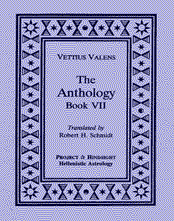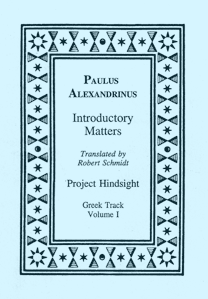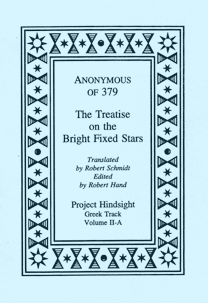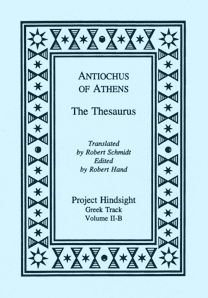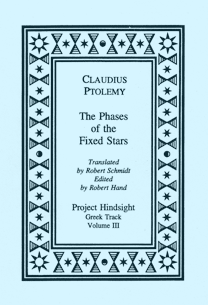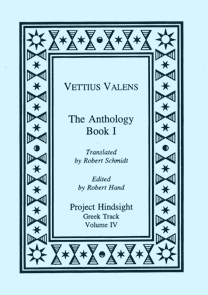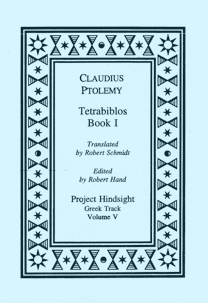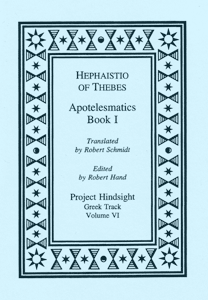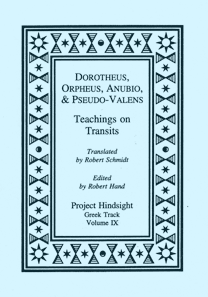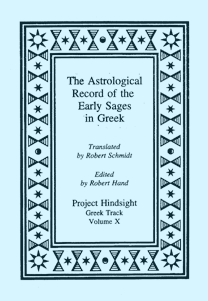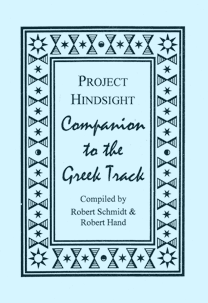Preliminary Translations
Hellenistic Track Translations
VETTIUS VALENS. ANTHOLOGY, Bk VII. Contains the only surviving intact presentation of an important timing procedure that derives directly from the earliest stratum of Hellenistic astrology, employing the periods of the planets and the ascentional times of the zoidia for the direct timing of planetary figures and configurations in a given nativity. Includes a method for investigating life expectancy based on a study of the domicile lord of the Ascendant in tandem with the domicile lord of the Lot of Fortune, supplemented with a study of the conjoinings of the Moon to other planets and a procedure for determining a succession of planets that have primary authority over the native's successes and failures in all areas of life.
Phase I Greek Track Translations
VOL. I: PAULUS ALEXANDRINUS. INTRODUCTION TO ASTROLOGY. (Complete). 378 A.D. Composed as an introduction for his son, and representing the main line of the tradition, it is the best way to get an overview of the major themes and concepts of Hellenistic astrology. It exhibits considerable sensitivity to the subtleties of the astrological language.
VOL. IIa: ANONYMOUS OF 379. ON THE FIXED STARS. A substantial chunk survives of this ambitious treatise, including elaborate natal delineations for 30 fixed stars when on the angles and when configured with the planets. The only work of its kind.
VOL. IIb: ANTIOCHUS OF ATHENS. FRAGMENTS FROM HIS THESAURUS. 2nd century A.D. The best source for the definition and clarification of specialized astrological terminology taken for granted by Ptolemy and others.
VOL. III: PTOLEMY. PHASES OF THE FIXED STARS. Circa 150 A.D. Astrological weather prediction based on heliacal risings & settings of 30 fixed stars, showing evidence of having been excised from the Almagest--perhaps censored? Complete calendar of predictions for every day of the Alexandrian year. Hints at the broader philosophical importance of the phasis concept.
VOL. IV: VETTIUS VALENS. ANTHOLOGY, Bk I. 160 A. D. The most definitive compendium of antiquity containing a critical assessment of the astrological thought of Valens' predecessors, thereby preserving much ancient astrology for posterity. Notable for its highly personal style and its emphasis on experience rather than theory alone. Book 1 contains extensive treatments of the nature and effects of the planets singly, two by two, and three by three. Similarly complete treatments of the 12 signs, and many other matters.
VOL. V: PTOLEMY. TETRABIBLOS, Bk I. Circa 150 A.D. A marvel of literary architecture, badly in need of a new translation. Book I first argues eloquently for the possibility and usefulness of astrology, and then presents Ptolemy's "scientific" framework for astrology within the context of Aristotelean natural philosophy. Deals with the special natures of the planets, signs, and configurations. Derives the dignities with reference to a tropical zodiac.
VOL. VI: HEPHAESTIO OF THEBES. COMPENDIUM, Bk I. 380 A.D. Treats of general principles of astrology & universal astrology, blending Ptolemy with Dorotheus and others. Highly interesting delineations of the decans. Also contains a very long excerpt from Nechepso/Petosiris on detailed eclipse delineation. Preserves an ancient Egyptian method of prediction using the Dog-Star alone.
VOL. VII: VETTIUS VALENS. ANTHOLOGY, Bk II. On the general subject of happiness and good fortune. Rough trimester predictions based on trigon rulers. Houses, Lots, and a derived house system reckoned not from the Ascendant but from the Lot of Fortune, with emphasis on the Place of Acquisition. Aspect delineation. Numerous other subjects. All illustrated with many sample charts.
VOL. VIII: VETTIUS VALENS. ANTHOLOGY, Bk III. On the general subject of length of life. The method of primary directions. The bound ruler. The combination of ascensional times with planetary periods. Prenatal new and full moons. Numerous examples of these life expectancy calculations. A large amount of dense but suggestive material on numerous alternative traditions.
VOL. IX: TEACHINGS ON TRANSITS. The four surviving Greek texts on transit delineation, attributed to Dorotheus, Orpheus, Anubio, and Valens. Some highly unexpected delineations suggest a different underlying principle. Indications as to the context in which transits were employed, and when they were to be taken into account.
VOL. X: THE ASTROLOGICAL RECORD OF THE EARLY SAGES IN GREEK. All the material found in the CCAG from astrologers who preceded Dorotheus, Valens, and Ptolemy or who seem to be independent of them. Hermes, Nechepso/Petosiris, Critodemus, "Zoroaster", "Pythagoras", Timaeus, Thrasyllus, Balbillus, & numerous others are represented. Most of it is katarchic or inceptional astrology.
VOL. XI: VETTIUS VALENS. ANTHOLOGY, Bk IV. More on aphesis. Distribution of times. The Lot of Fortune and times of life. Transferral and Reception of chronocratorship. "Assignments" of planets to planets. Much more miscellaneous lore and the usual complement of examples.
VOL. XII: PTOLEMY. TETRABIBLOS, Bk III. Genethliacal astrology and predictions for the characteristic events in human life, mainly using Ptolemy's preferred method of planetary significators. Contains the notoriously obscure treatment of primary directions and length of life. The translator's preface contains an analysis of house division, planetary strenght, and cusps in Hellenistic astrology.
VOL. XIII: VETTIUS VALENS. ANTHOLOGY, Bks V & VI. Eclipses, Inceptions, and the "Climacteric Year". Place of accusation. More on releasings of the years. Keys to using profections. Some electional material. Philosophical digression on the nature of prognostication and training of the soul.
VOL. XIV: PTOLEMY. TETRABIBLOS, Bk IV. Completes the treatment of natal astrology begun in Bk III. Covers the topics of possessions, rank and eminence, work, marriage and sexual union, children, friends and enemies, travel abroad, and quality of death, and ends with a treatment of Ptolemy's preferred system and hierarchy of time-lords.The translator's preface contains a discussion of sect and related rejoicing conditions in Hellenistic astrology.
VOL. XV: HEPHAISTIO OF THEBES. COMPENDIUM, Bk II. 380 A.D. Deals with "topics", or special subject areas in the native's life. Contains an extensive summary of procedures for rectification and the study of the conception chart, a commentary on Ptolemy's treatment of length of life, a discussion of the time-lord method later called decennials accompanied by fairly elaborate delineations of planet pairs, a treatment of rank and honor with three chart examples including one that is the most elaborate and detailed surviving Hellenistic chart reading, plus a great deal of miscellaneous astrological lore. Much of this material is found in no other Hellenistic source.
PROJECT HINDSIGHT COMPANION TO THE GREEK TRACK. Some statements of method from Hellenistic astrology on how to read a chart, a glossary of Greek astrological terms, a list of the primary astrologers from Hellenistic times through the early Byzantine period, plus a collection of useful tables. Much of this material can be found on our Reference page. Out of Print.
